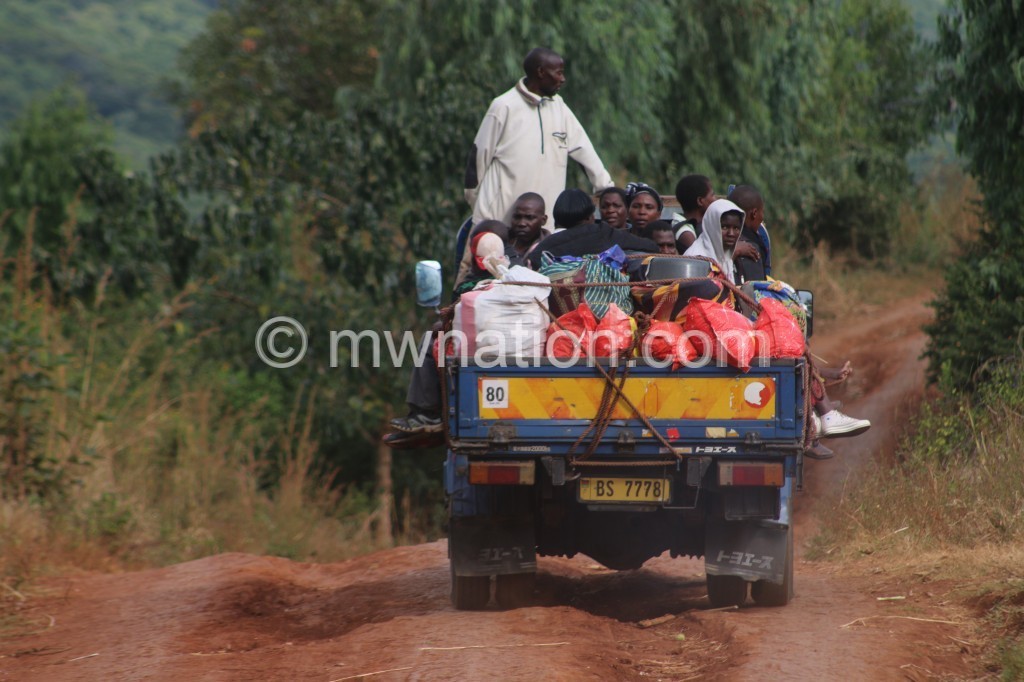Burdens of poor road network in Mwanza
They sell the bulk of their produce—pigeon peas, sugar canes, oranges, tomatoes and cassava—in Mozambique. Not to maximise profits, but to have fair prices.
Communities of Thambani in Sub Traditional Authority (Sub T/A) Govati in Mwanza even prefer using roads in Mozambique to the local route to get to the boma as the latter is called a death trap.

Travelling through their rutted earth road from the boma is costly, forcing vendors, mainly from Blantyre, to impose low prices on the crops.
Amos Fasitoni of Kayera Village says the poor road raises hopeless poverty among the communities.
“We do not reap enough from our sweat due to poor prices. It is difficult to get here and vendors always factor in expenses caused by this condition to determine worth of crops,” he says.
The poor condition of the road worsens the farmers’ situation. The road is also said to be a death trap for pregnant mothers referred to Mwanza District Hospital for specialised treatments.
Shared problems
Jovita Makoko, chairperson of safe motherhood in Tsegula Village, says pregnant women keep on losing life and other people die of treatable diseases while on the way to the district hospital as the road is not conducive.
“Fewer women give births at Thambani Health Centre because of lack of skilled staff. It is usually by God’s grace to reach Mwanza through Thambani alive,” says Makoko.
Worse still, the state of the road always makes the area’s ambulance to break down frequently. Makoko adds that communities hardly use the ambulance because they are asked to provide fuel, a condition they do not meet.
“Most cases are referred to the district hospital, which is a burden to get money for transport because we sell crops at a loss. It seems we are not considered in government’s road development projects which other districts are benefitting,” she says.
With a minimum of K5 000, one travels comfortably from Blantyre to Lilongwe and have enough to spend on snacks along the 320 kilometres stretch on the M1 Road.
However, people in Mwanza spend the amount on a 26 kilometre-stretch to get to the boma for business or to access standard medical services. This is due to the rough earth road that is rarely renovated.
Nolis Mtimauyeranji of Chikoleka Village says pregnant mothers pay K5 000 and a goat to motorcycle taxis or lorry operators with no assurance to get to the district hospital in time.
“We are victims of duty bearers and civil servants failure to upgrade the Chikwawa-Chapananga-Mwanza Road,” she says, adding: “This defeats the call of common good in the country. People have died of curable diseases because could not get to Mwanza [district hospital] in time for treatment.”
The area is hilly and commuting between Thambani and Mwanza is tough because of this bumpy and dusty road.
This status hinders every effort communities take to break shackles of poverty in order to achieve socio-economic development.
Good news
Now Thambani people can afford a smile: Government has allocated K3 billion in this fiscal year for construction of the first phase of this road.
All along, the communities have been advocating on status of the road through capacity building in Citizen Action for Local Governance Accountability (Calga) programme being implemented by Association of Progressive Women (APW) in Mwanza and Neno.
The programme, being funded by Tilitonse Fund through DanChurchAid, challenges communities to hold duty bearers accountable and conduct public expenditure tracking (PET).
Speaking on the allocation, Sub T/A Govati asked government officials not to embezzle the fund, saying the report will make sense once the project starts.
“We [traditional leaders] are doing a lot to save lives of pregnant women, but maternal deaths are on the rise due to the poor road.
“Lest we forget in 1983, it was along this road the remains of Aaron Gadama, Dick Matenje and others were found. It is time the road was upgraded,” says Govati.
APW executive director Noel Msiska commends communities for the advocacy that will have their needs met.
“Communities should make duty bearers active. Thambani communities have to keep on advocating until all necessary services and infrastructures are in their vicinity,” he says.
Msiska also asks the communities to monitor the road project to see if quality of work corresponds to the allocation in order to have meaningful development, not a substandard road.
Mwanza West legislator Paul Chibingu pleads with the communities for patience on the project, saying the implementation will not be done as they wish.
“Government is equally concerned with the ordeal they face in the absence of a tarmac road. Communities should take heart because this is a big project under government plans that member of Parliament cannot implement with personal cash,” he says.





